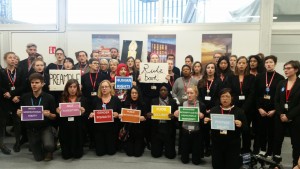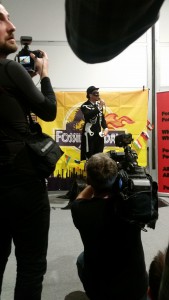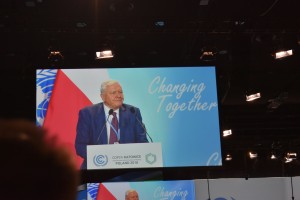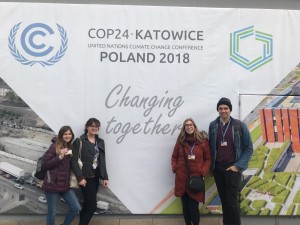Over the week there have been several protests in and around the COP to bring attention to certain issues that should be addressed in the Negotiations. Yesterday, Friday, Shana and I actually got to participate in a protest chanting “Climate equals Health, Our Health is up to you” to ensure that more public health issues are directly addressed in countries’ nationally determined contributions (NDC). While Shana is a tried and tested protester, this was my first time actually participating in a protest (rather than just observing one) and I was pretty proud of myself for pushing the boundaries of my comfort zone and try to make a difference.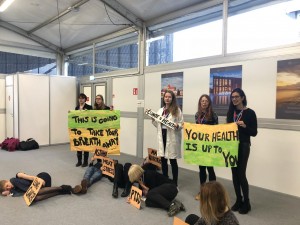
But that got me thinking. How effective are protests at the COP actually? This year’s protests in Poland are more restricted than they have been in the past and one needs to have the protest approved and no microphones are allowed. Regardless of the extra restrictions with this year’s protester’s abilities, I think protests in general add a totally different dynamic to the COP. The negotiations I have been to at the COP have more so been about the language used in various agreements rather than debates about what should or should not be directly addressed. Furthermore, even if a specific issue were being added to the agreement, I have the distinct impression that the debates between states would generally agree that the issue should be included but would argue about the language of the agreement to the extent where it would end up being as vague as possible so that countries do not have to necessarily act upon said issue. To what extent does a protest really force countries to change the language of an agreement? Does it matter how many people and the type of people who get involved?
The three protests I attended during my time at the COP were all very different from one another.
A protest on Tuesday organised by SustainUS to Keep Fossils in the Ground! had around 20 people in the protest surrounded by 30 or so people watching the protest, most of whom I thought were young people. There was a lot of chanting, various people speaking about their personal experiences with fossil fuels, and while the audience was pretty big, it did not get much bigger. This protest was quickly followed by an organised Press Conference that concisely defined the movement’s demands. A protest on Friday on Human Rights had a similar atmosphere around it in terms of the people that were there but there was a lot more silence than chanting. Furthermore everyone from that protest was wearing black and had red lanyards for the entire day to continue their protest.
Finally, the protest I actually participated in, also on Friday, about Climate Change and Health did not have that many participants, nor that big of an audience. We played out a skit and then did some chants but there was not a speech of what we were actually demanding which I thought could have really helped others understand the goals of the protest. Although the audience was not very big, I did think that because we were not completely blocking off a hallway, that people walking past could actually see our protest rather than having to walk past a big herd of people who are encircling the protest and thus are also obstructing the ability for passers by to see the protest. We did get press coverage by a couple of country’s news outlets (and by a couple, I mean exactly 3) but it is difficult to tell the effect of the news coverage on important COP negotiations too.
The primary goals of all these protests at COP are to change the way that the agreements are being negotiated and in order for that to happen, the actual negotiators should be listening. Are they really listening though? There are long negotiations continuously throughout the day so when would a delegate even have time to see the protest? A lot of the issues brought up in these processes are further talked about in side events and press conferences, but again, most state representatives are too busy to go to these meetings (I certainly haven’t seen many of them at the events I went to). Many states have prepared for weeks in advance their specific strategies of negotiating deals and have specific orders of what the outcomes should be at the end of the two weeks. Thus, how would an impromptu protest change a state’s stance on the climate negotiation?
Protests do have an impact, I’m not denying that. But I do wonder whether protests are the right way to make an impact at the COP. The protests I have seen have all been organized by young people and it seems that at the COP, protests are the only way in which non-governmental organizers (especially YOUNGOs) can make their voices heard since they are prohibited from even entering high level negotiations. I believe that the questions posed here are definitely worth looking into and I think that in addressing them, people could make their protests more effective.
